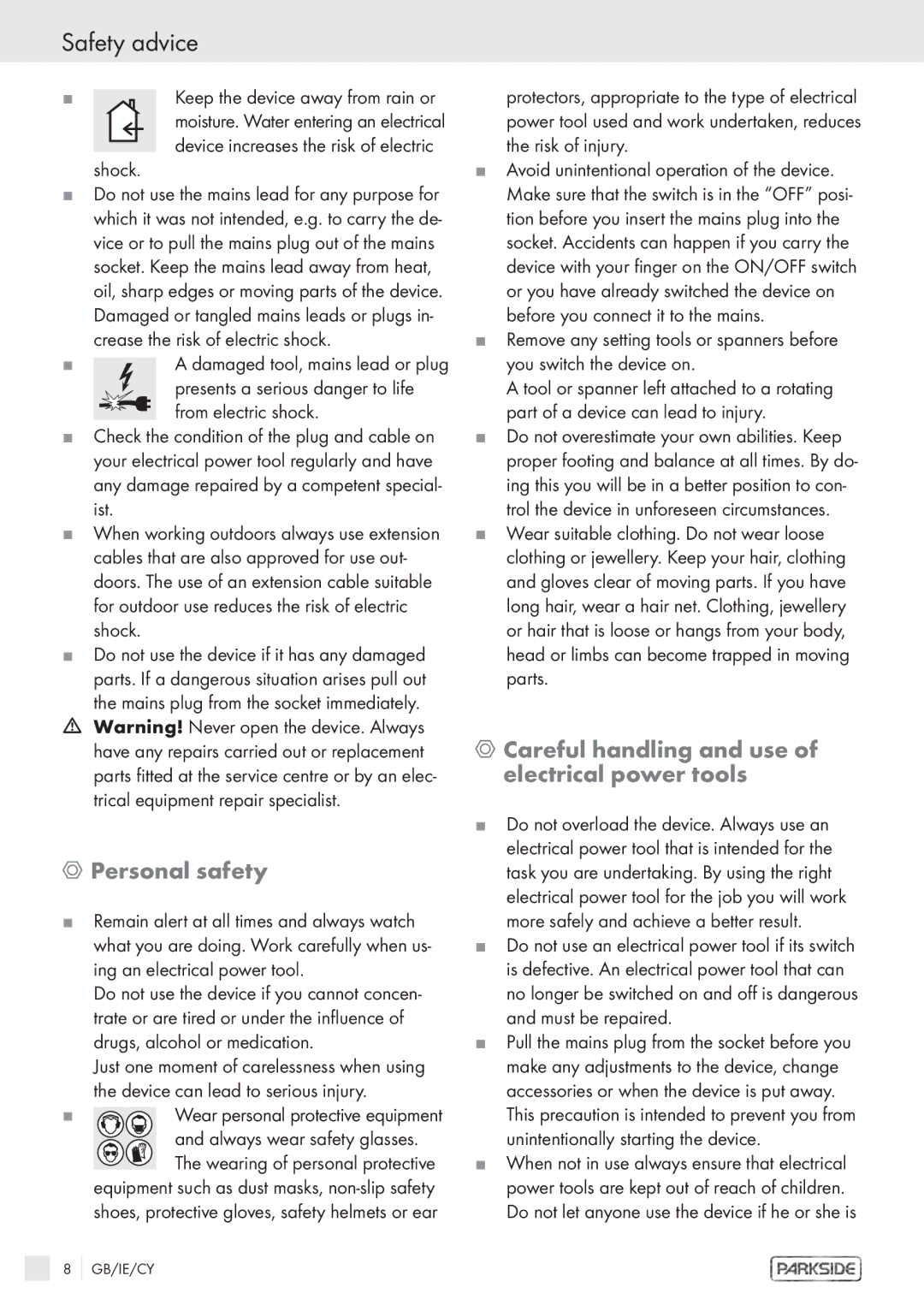
Safety advice
JKeep the device away from rain or moisture. Water entering an electrical
device increases the risk of electric
shock.
JDo not use the mains lead for any purpose for which it was not intended, e.g. to carry the de- vice or to pull the mains plug out of the mains socket. Keep the mains lead away from heat, oil, sharp edges or moving parts of the device. Damaged or tangled mains leads or plugs in- crease the risk of electric shock.
JA damaged tool, mains lead or plug
presents a serious danger to life from electric shock.
JCheck the condition of the plug and cable on your electrical power tool regularly and have any damage repaired by a competent special- ist.
JWhen working outdoors always use extension cables that are also approved for use out- doors. The use of an extension cable suitable for outdoor use reduces the risk of electric shock.
JDo not use the device if it has any damaged
parts. If a dangerous situation arises pull out the mains plug from the socket immediately.
mWarning! Never open the device. Always have any repairs carried out or replacement parts fitted at the service centre or by an elec- trical equipment repair specialist.
 Personal safety
Personal safety
JRemain alert at all times and always watch what you are doing. Work carefully when us- ing an electrical power tool.
Do not use the device if you cannot concen- trate or are tired or under the influence of drugs, alcohol or medication.
Just one moment of carelessness when using the device can lead to serious injury.
JWear personal protective equipment
and always wear safety glasses. The wearing of personal protective
equipment such as dust masks,
8 GB/IE/CY
protectors, appropriate to the type of electrical power tool used and work undertaken, reduces the risk of injury.
JAvoid unintentional operation of the device. Make sure that the switch is in the “OFF” posi- tion before you insert the mains plug into the socket. Accidents can happen if you carry the device with your finger on the ON/OFF switch or you have already switched the device on before you connect it to the mains.
JRemove any setting tools or spanners before you switch the device on.
A tool or spanner left attached to a rotating part of a device can lead to injury.
JDo not overestimate your own abilities. Keep proper footing and balance at all times. By do- ing this you will be in a better position to con- trol the device in unforeseen circumstances.
JWear suitable clothing. Do not wear loose clothing or jewellery. Keep your hair, clothing and gloves clear of moving parts. If you have long hair, wear a hair net. Clothing, jewellery or hair that is loose or hangs from your body, head or limbs can become trapped in moving parts.
 Careful handling and use of electrical power tools
Careful handling and use of electrical power tools
JDo not overload the device. Always use an electrical power tool that is intended for the task you are undertaking. By using the right electrical power tool for the job you will work more safely and achieve a better result.
JDo not use an electrical power tool if its switch is defective. An electrical power tool that can no longer be switched on and off is dangerous and must be repaired.
JPull the mains plug from the socket before you make any adjustments to the device, change accessories or when the device is put away. This precaution is intended to prevent you from unintentionally starting the device.
JWhen not in use always ensure that electrical power tools are kept out of reach of children. Do not let anyone use the device if he or she is
